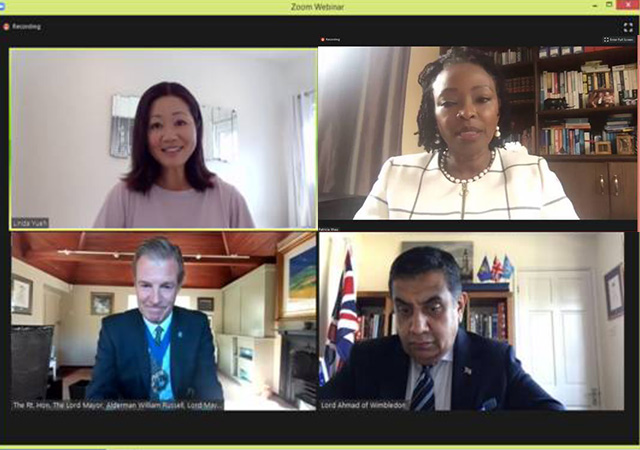 RCS Webinar panel. Clockwise: Chair Linda Yueh, Patricia Ithau, Lord Ahmad of Wimbledon and The Lord Mayor of the City of London, Alderman William Russell.
RCS Webinar panel. Clockwise: Chair Linda Yueh, Patricia Ithau, Lord Ahmad of Wimbledon and The Lord Mayor of the City of London, Alderman William Russell.
How has COVID-19 affected the Commonwealth? What will become of the UK’s trade and investment agenda with the Commonwealth after Brexit? What will be the business opportunities within the Commonwealth after the pandemic and Brexit? These were the key questions posed by the Royal Commonwealth Society (RCS) at a 10 September webinar.
The session brought together a powerful panel:
- the UK Minister of State for South Asia and the Commonwealth, Lord Ahmad of Wimbledon
- the Lord Mayor of the City of London, the Rt. Hon. Lord Mayor, Alderman William Russell
- and the East Africa Regional Director of Stanford Seed, the Stanford Institute for Innovation in Developing Economies, Patricia Ithau.
With the 2020 Commonwealth Heads of Government (CHOGM) pushed into 2021 because of the coronavirus pandemic and the imminent final stage of the UK’s exit from the European Union, the webinar provided a snapshot of the UK’s role as the extended Commonwealth Chair-in-Office and its post-Brexit aspirations, as well as a timely look at what a post-pandemic Commonwealth could and should look like.
It also allowed RCS Chair Linda Yueh to shine a spotlight on how the newly formed Foreign, Commonwealth and Development Office (FCDO) viewed its role, as it began integrating the Foreign and Commonwealth Office (FCO) with the Department for International Development (DFID).
A “re-positioned normal”
The three panellists focused on the opportunities opened up by the Covid pandemic, as well as the technological and other options that had emerged during the global lockdown. Lord Ahmad said that the pandemic had highlighted “the interdependency of humanity”, as communities including the Commonwealth family had found new ways to strengthen their links. “It is now more important than ever that we come together,” he told the webinar. He said Commonwealth foreign ministers had met during the lockdown to look at international trade disruption, employment and the impact of the pandemic on small states. “The pandemic has focused our minds on how we deliver,” Lord Ahmad said. highlighting the role of technology in education and health.
Alderman Russell spoke of the City of London (the UK’s business heart) working quickly towards a “re-positioned normal”. He said that COVID-19 had shown the “resilience of sustained investment” and the need to “ensure [that] any recovery is a green one”. In the countdown to both COP26 and CHOGM 2021, he said business needed to help boost sustainable infrastructure and that there was a need to get private capital into green economic development and to boost digital investment. He said that East Africa was ahead of the digital game, because it did not have to deal with the “legacy systems” in places such as London.
On this note, Patricia Ithau, who also sits on the board of Trade Mark East Africa, said the pandemic had indicated the need for business to focus on producing the services, solutions and products that people deeply cared about. “The rallying call now is purpose over profit,” she said. Talking of “the new world order that we live in”, she said that the Commonwealth could use its full diversity to forge new trade ties, address the issues facing developing countries and capitalise on existing collaboration within the grouping. Ms Ithau said the Commonwealth had to make sure that no-one was left behind in terms of technology.
Kigali 2021
With the postponement of CHOGM 2020, the UK has been extended as Commonwealth Chair-in-Office. Dr Yueh asked Lord Ahmad about the lessons for the UK in this role since CHOGM 2018. Lord Ahmad said that a key lesson had been the need to “join the dots” between summits, so that individual CHOGMs were not held in silos. He said he had been speaking with Rwanda’s foreign minister and with the Commonwealth Secretariat to make sure that the lessons learnt could be recorded for the incoming chair.
During the Q&A session, Lord Ahmad said he was glad that the word “Commonwealth” had remained central to the new FCDO ministry. He said that the merged ministries would help to save time – something his previous business career had shown to provide greater strength. He said that the new FCDO would “do so much more within the Commonwealth”.
On post-Brexit trade opportunities, Alderman Russell took questions on the work being done by the UK Treasury and the City of London to forge new trade deals. He said that virtual visits and negotiations were already at an “advanced stage” with Australia and New Zealand.
Patricia Ithau called for a move to non-tariff trade regulations within the Commonwealth. She also suggested that it was important to improve the competitiveness of smaller countries in order to do better business in the Commonwealth.
The panellists agreed on the “top outcomes” for Kigali 2021: continuity for Commonwealth goals, a commitment to continued civic society access to heads of government, and work on a “cleaner, greener recovery” following the damage done by the pandemic.



